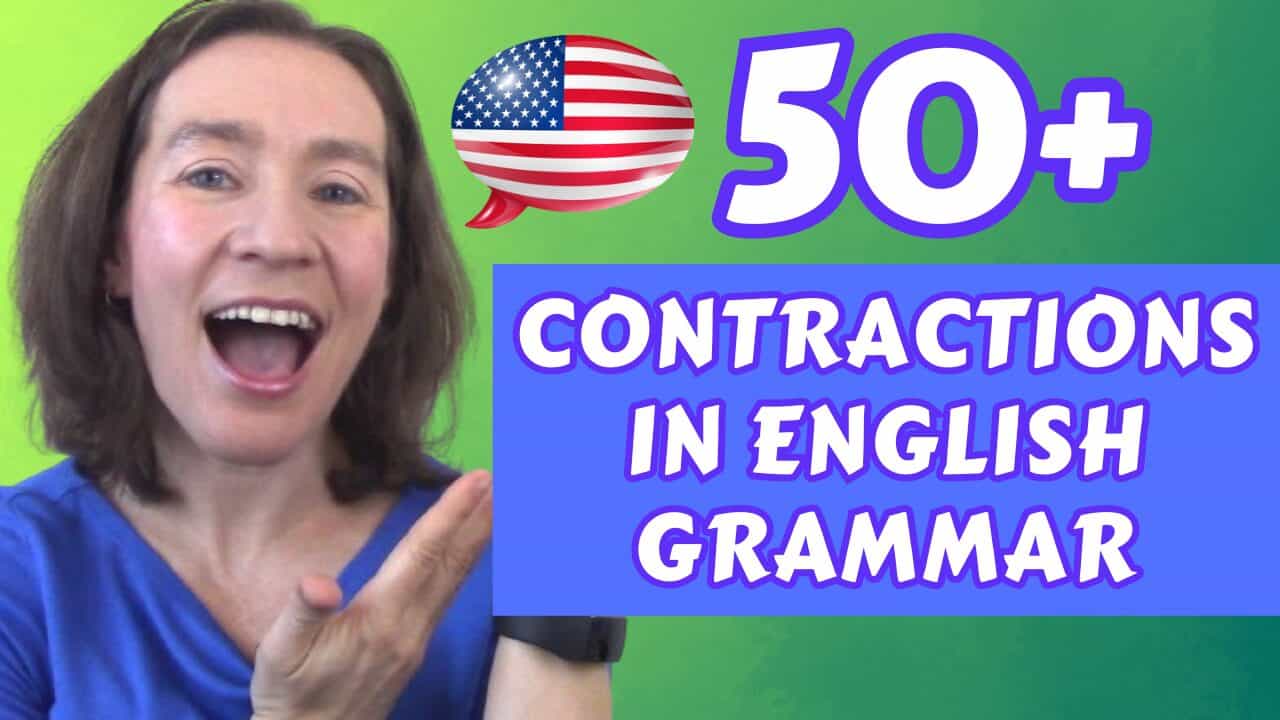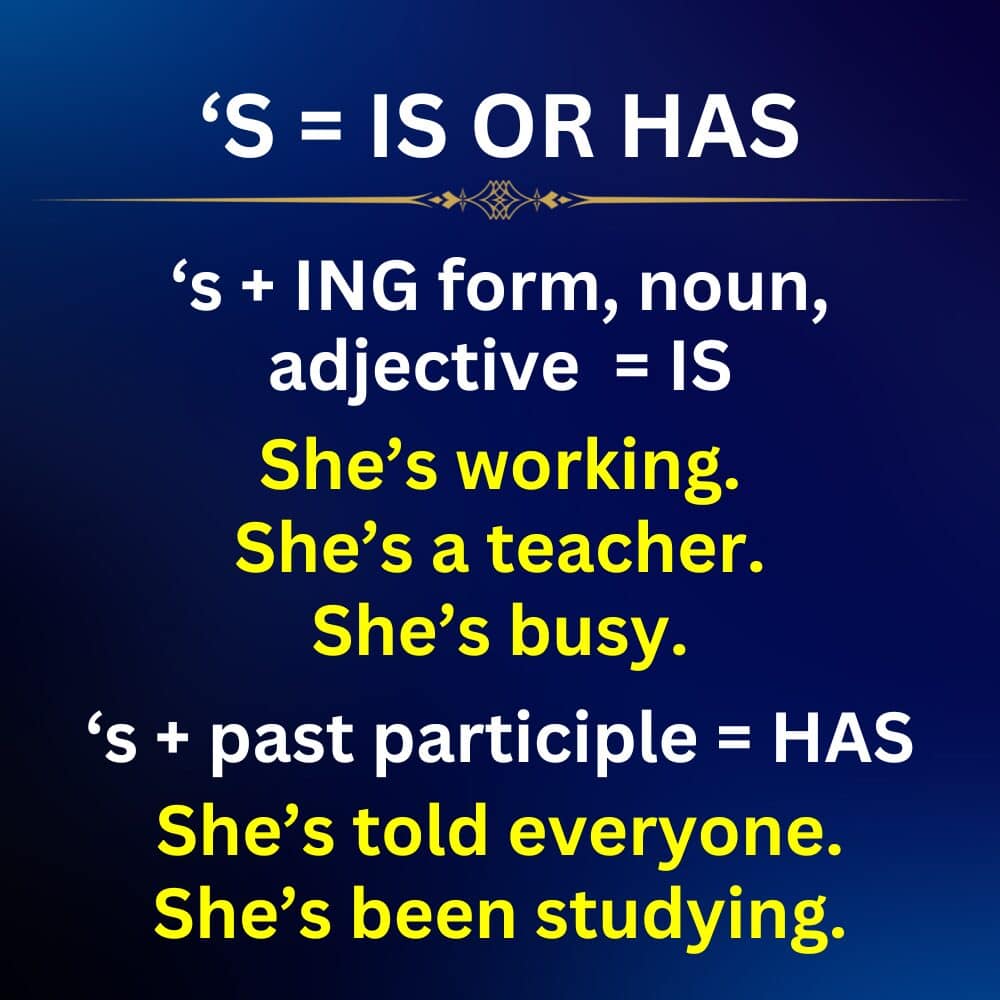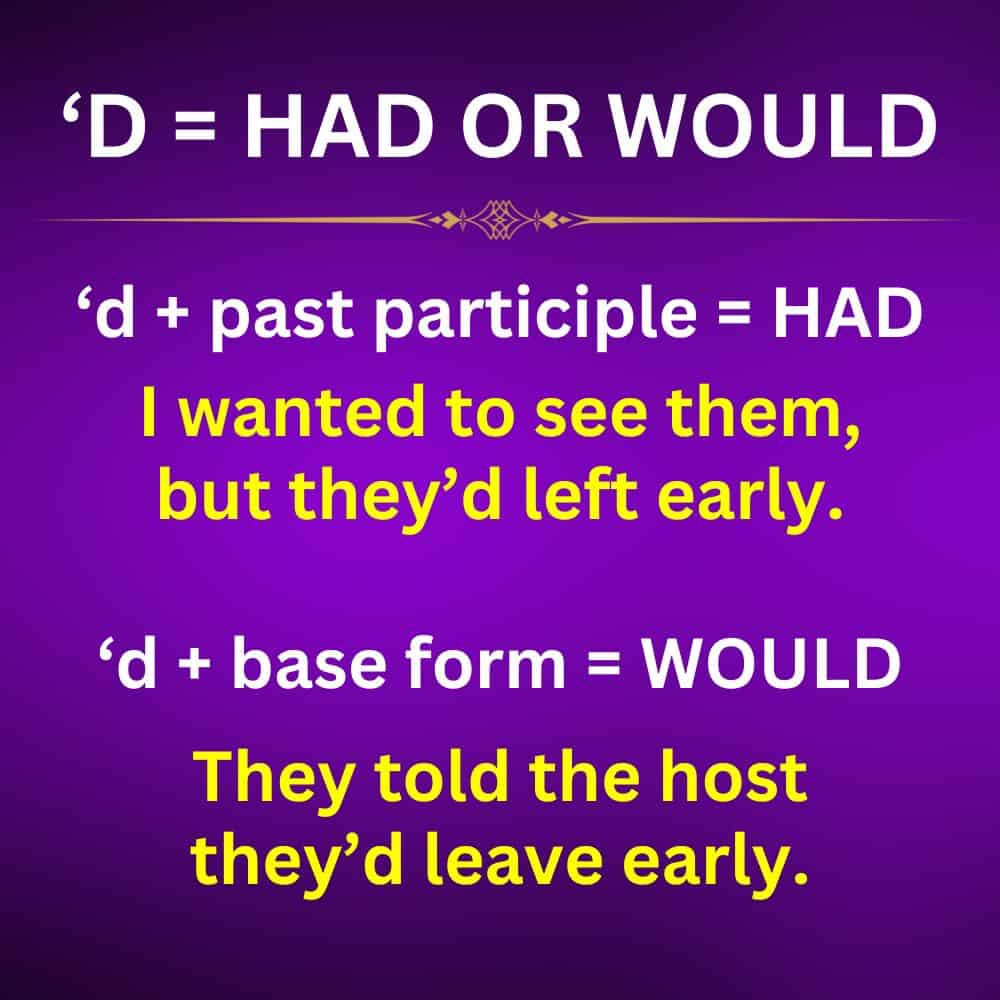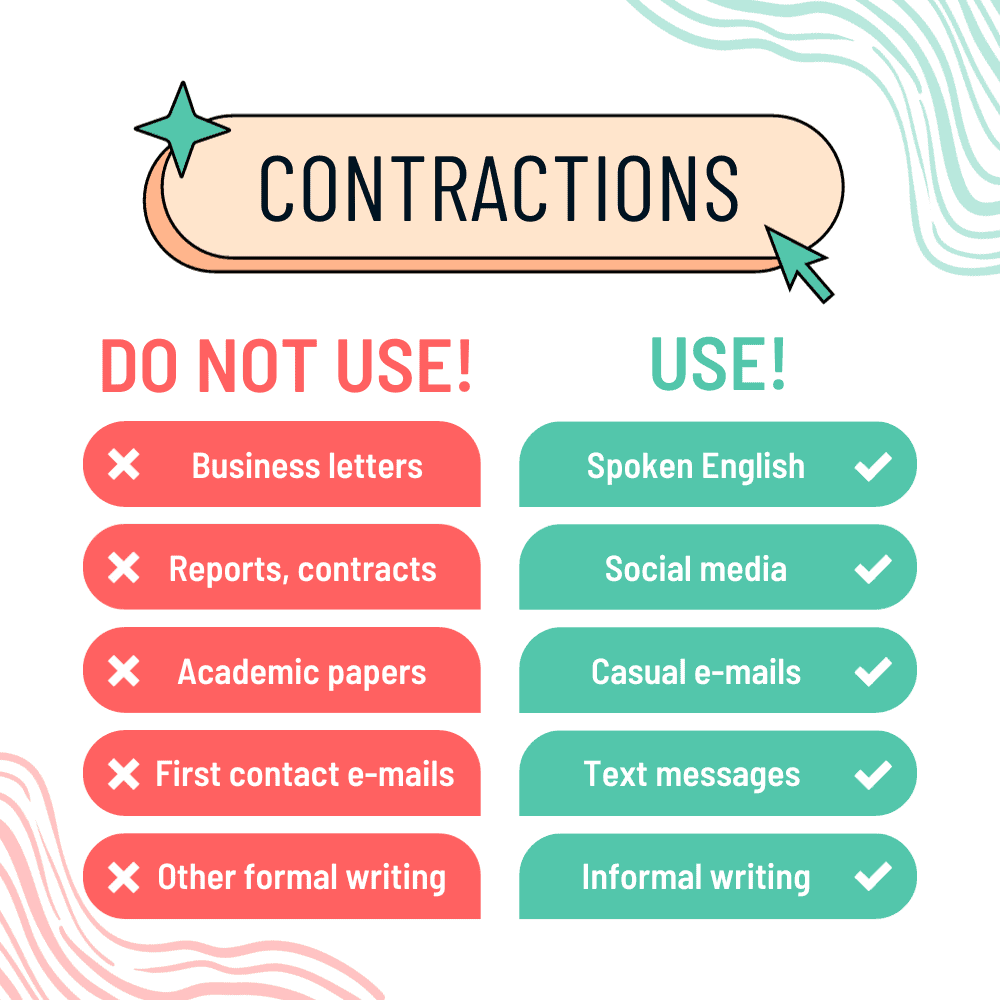
[ad_1]
Contractions mix two phrases into a brief kind with an apostrophe to switch the lacking letter or letters – for instance,
- I’m turns into I’m
- couldn’t turns into couldn’t
- …and lots of extra that you simply’ll be taught within the contractions listing under!
Contractions are extraordinarily frequent in spoken English and casual written English, and immediately you’re going to be taught 50 of them – sure, we do have that many contractions within the English language!
Contractions with NOT
- aren’t – aren’t
- can’t – can’t
(be aware that can’t is the one one in all these that’s a single phrase, and not using a house between can and never) - couldn’t – couldn’t
- didn’t – didn’t
- don’t – don’t
- doesn’t – doesn’t
- had not – hadn’t
- has not – hasn’t
- haven’t – haven’t
- shouldn’t be – isn’t
- should not – mustn’t (not frequent in American English)
- shouldn’t – shouldn’t
- was not – wasn’t
- weren’t – weren’t
- won’t – received’t
- wouldn’t – wouldn’t
A couple of instance sentences:
- I didn’t go to the gymnasium immediately.
- We haven’t completed the undertaking but.
- You shouldn’t drive so quick.
- He wasn’t on the occasion.
One factor you would possibly discover once I say these sentences is that the ultimate “t” nearly disappears. I don’t say “He wasn’t on the occasion,” it sounds extra like “He wasn’on the occasion.” That is simply one thing that occurs when talking naturally, and I need you to concentrate on it while you’re listening to native English audio system speaking quick.
Contractions with “not” are sometimes utilized in tag questions:
- You’re drained, aren’t you?
- That was enjoyable, wasn’t it?
- He lives there, doesn’t he?
Contractions with BE (am – is – are)
- I’m – I’m
- he’s – he’s
- she is – she’s
- it’s – it’s
- John is – John’s
- you’re – you’re
- we’re – we’re
- they’re – they’re
And a few examples:
- I’m hungry.
- It’s raining.
- She’s good at math.
- We’re studying contractions.
- They’re from Brazil.
One factor to concentrate on is that we’re (we’re) typically seems like “had been” when talking quick.
Contractions with HAVE, HAS, and HAD:
HAVE
- I’ve – I’ve
- you’ve – you’ve
- now we have – we’ve
- they’ve – they’ve
- ought to have – ought to’ve
- may have – may’ve
- would have – would’ve
Notice that the brief types of these modal verbs are at all times ought to’ve, may’ve, would’ve and by no means ought to of, may of, would of.
HAS
- he has – he’s
- she has – she’s
- it has – it’s
HAD
- I had – I’d
- you had – you’d
- he had – he’d
- she had – she’d
- we had – we’d
- they’d – they’d
We use have/has within the current excellent tense, as in these examples:
- I’ve completed the e book.
- You’ve been working laborious.
- She’s already eaten dinner.
- He’s been sick all week.
- We’re going to be late – we ought to’ve left earlier.
We do NOT use the contracted kind if “have/has/had” is the MAIN VERB of the sentence, that means possession. We solely use the contraction when have/has/had is performing as a serving to verb.
- Primary verb: I have a canine. (not “I’ve a canine”)
- Serving to verb: I‘ve adopted a canine.
- Primary verb: He has an outdated automobile.
- Serving to verb: He’s been driving that automobile for 20 years.
- Primary verb: We had a superb time final night time.
- Serving to verb: We helped him as a result of we‘d promised to take action.
- Primary verb: The pharmacy ought to have that medication.
- Serving to verb: You ought to’ve apologized for being impolite.
Additionally, you would possibly discover that she’s may very well be “she is” or “she has” – how will you know which one?
Take a look at the entire sentence.
If it’s adopted by an -ING verb or by an adjective or noun, which means “she is”:
- She’s getting ready a lesson. (She is getting ready)
- She’s a trainer. (She is a trainer)
- She’s busy. (She is busy)
If it’s adopted by a previous participle, which means “she has”:
- She’s instructed everybody the information. (She has instructed)
- She’s been planning her trip. (She has been)
Notice: ‘s can be utilized in possessive nouns (John’s children, Mary’s automobile).
We use contractions with had previously excellent tense, as in these examples:
- By the point I arrived, he’d already left.
- We’d been desirous about promoting our home, however we modified our minds.
- They mentioned they’d gotten a canine.

Contractions with WILL
Quite a lot of these sound a bit completely different when spoken quick, as you’ll see within the instance sentences)
- I’ll – I’ll (typically seems like “all”)
- you’ll – you’ll
- he’ll – he’ll (typically seems like “hill”)
- she is going to – she’ll (typically seems like “shill”)
- it would – it’ll
- we’ll – we’ll (typically seems like “will”)
- they’ll – they’ll
Let’s take a look at and hearken to the examples:
- I’ll get again to you later.
- I believe he’ll just like the reward.
- We’ll be touring subsequent week.
- Speak to Jane – she’ll enable you to arrange your account.
Contractions with WOULD
- I’d – I’d
- you’ll – you’d
- he would – he’d
- she would – she’d
- we’d – we’d
- they might – they’d
For instance:
- I’d wish to see the dessert menu, please.
- If he ate more healthy meals, he’d really feel higher.
- After we had been children, we’d go to the seashore each summer season.
Once more, now we have an issue – they’d can imply they’d or they might – how will you know which one? By taking a look at what comes after it.
They’d + previous participle means “they’d,” and they’d + base kind means “they might”:
- I wished to see them, however they’d already left. (they’d already left)
- They instructed the host they’d go away early. (they would depart)
- He was disenchanted as a result of he’d gotten a nasty grade on the take a look at. (he had gotten)
- If he studied extra, he’d get higher grades. (he would get)

Contractions with different phrases
We’ve been specializing in contractions with topics which might be individuals – I, you, he, she, and many others. however we even have some frequent contractions with different phrases – so let’s end this lesson by taking a look at a few of these.
Right here is and there may be develop into right here’s and there’s. For instance:
- Right here’s the e book you requested for.
- There’s no extra milk within the fridge.
We don’t make contractions in writing with listed here are and there are, although they may sound shorter when talking:
- Listed here are the magazines you requested for.
- There aren’t any extra eggs within the fridge.
That’s turns into that’s, and that might turns into that’d:
- You bought promoted? That’s nice!
- For those who can choose up some groceries in your manner house from work, that’d be useful.
(be aware that when talking, that’d nearly seems like “thad”)
This may and that may develop into this’ll and that’ll:
- This’ll be the primary time my son travels by himself.
- She desires to make all of the decorations by hand, however I believe that’ll take too lengthy.
We additionally see quite a lot of contractions with query phrases:
- What’s/has – what’s
- What’s your identify?
- What’s he been doing currently?
- The place is – the place’s
- The place’s the closest gasoline station?
- The place did – the place’d
- The place’d you go final night time?
- When is – when’s
- When’s your birthday?
- When’s a superb time for a gathering?
- Who’s/has – who’s
- Who’s one of the best scholar within the class?
- How is/has – how’s
- How’s your loved ones?
- How’s the whole lot been at work?
- How did/would – how’d
- How’d you end your homework so quick?
- How’d you wish to exit for dinner?
- Why is/has – why’s
- Why’s the TV on if no person’s watching?
- Why did – why’d
- Why’d he go away work early?
- Allow us to – let’s
- Let’s be taught all about English grammar!
When to make use of and when NOT to make use of contractions
After we’re talking English, we use contractions fairly often – just about anytime there’s a possibility to make use of one, we use it in on a regular basis speech. In any other case, your talking would sound type of unusual and robotic – plus it takes longer. Examine these:
- I’d love to assist tomorrow, however there’s a good cause I can’t – my automobile shouldn’t be working, so I will likely be taking it to the mechanic.
- I’d love to assist tomorrow, however there’s a superb cause I can’t – my automobile’s not working, so I’ll be taking it to the mechanic.
We keep away from contractions in formal writing – so that might be enterprise letters and experiences, contracts, educational essays and analysis papers.
We can use contractions in casual writing – informal emails, weblog posts, social media posts/feedback, textual content messages, and many others.
What about e-mails at work – are these thought of formal or casual?
It relies upon – contractions are fantastic in e-mails to individuals who you commonly talk with, like your co-workers, supervisors or staff, purchasers with whom you have already got a relationship, and many others.
However it’s best to keep away from contractions if it’s the very first time you’re contacting somebody, resembling in an e-mailed cowl letter inquiring a couple of job you need, or while you’re reaching out to a model new shopper or somebody at one other firm while you’re starting a enterprise relationship with them. In these conditions we have a tendency to write down just a little extra formally, after which the communication fashion turns into extra informal over time as extra messages get exchanged.

Contractions listing & contractions worksheets
Now you already know all about contractions within the English language, and also you’ve seen a lot of examples!
Listed here are some contractions worksheets and actions that can assist you observe.
Extra Espresso English Classes:
[ad_2]